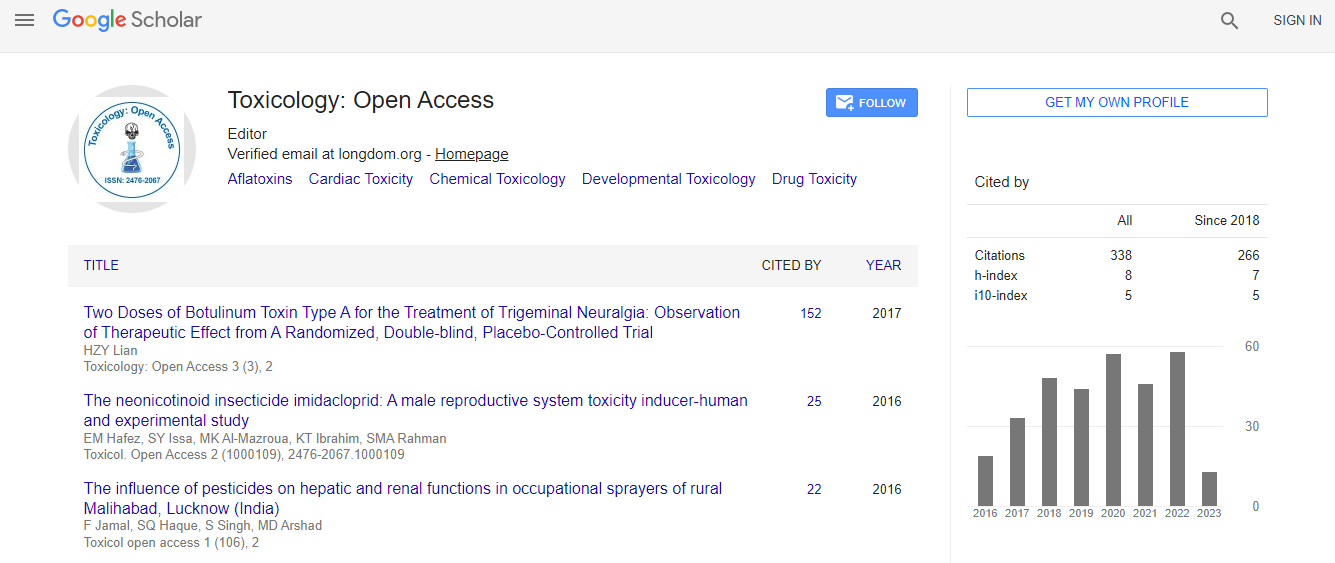Our Group organises 3000+ Global Conferenceseries Events every year across USA, Europe & Asia with support from 1000 more scientific Societies and Publishes 700+ Open Access Journals which contains over 50000 eminent personalities, reputed scientists as editorial board members.
Open Access Journals gaining more Readers and Citations
700 Journals and 15,000,000 Readers Each Journal is getting 25,000+ Readers
Google Scholar citation report
Citations : 336
Toxicology: Open Access received 336 citations as per Google Scholar report
Indexed In
- Google Scholar
- RefSeek
- Hamdard University
- EBSCO A-Z
- Geneva Foundation for Medical Education and Research
- Euro Pub
- ICMJE
Useful Links
Related Subjects
Share This Page
Pharmacological optimization of the conditioning regimen for hematopoietic stem cell transplantation
20th World Congress on Toxicology and Pharmacology
Ben C Valdez and Borje S Andersson
The University of Texas MD Anderson Cancer Center, USA
ScientificTracks Abstracts: Toxicol Open Access
Abstract
Hematopoietic stem cell transplantation is an effective treatment for a variety of hematological disorders. Its success partly depends on the optimization of the pre-transplant conditioning regimen. To identify an efficacious regimen, we exposed cells to different drug combinations, analyzed their cytotoxicity and identified their molecular mechanisms of interaction using various techniques. We have shown the synergistic cytotoxicity of DNA Alkylating Agents (AA) and Nucleoside Analogs (NA) in leukemia and lymphoma cells and proposed a mechanistic model called the loop of death. Exposure of cells to a nucleoside analog initiates DNA damage resulting in chromatin remodeling and makes genomic DNA more susceptible to DNA alkylation. DNA damage response is then activated and the loop of DNA damage, chromatin remodeling and DNA alkylation continues until the tumor cells commit to apoptosis. Using this model and the [AA+NA] combination as a backbone to identify drugs that may further enhance its anti-tumor activity, we hypothesized that epigenetic modifiers would amplify the loop of death. Indeed, inhibitors of Histone Deacetylases (HDACi) and DNA Methyl Transferases (DNMTi), which facilitate relaxation of chromatin, were found to be synergistic with [AA+NA]. Since active DNA repair may contribute to decreased efficacy of these drug combinations, we also examined the inclusion of DNA repair inhibitors such as olaparib. Addition of olaparib to [AA+NA] caused significant apoptosis by activation of the DNA, damage response, inhibition of PARP activity and DNA repair, production of reactive oxygen species and depolarization of the mitochondrial membranes. Overall, our preclinical and clinical results suggest that the conditioning regimen for HSCT may be optimized by combining drugs that provide synergistic cytotoxicity based on their molecular mechanisms of action.Biography
Ben C Valdez has completed his PhD in Biochemistry at Louisiana State University. He has completed his Post-doctoral training at Baylor College of Medicine in Houston, Texas. His current research focuses on the identification of safe and efficacious conditioning regimen for hematopoietic stem cell transplantation for patients with hematological disorders.
E-mail: bvaldez@mdanderson.org

 Spanish
Spanish  Chinese
Chinese  Russian
Russian  German
German  French
French  Japanese
Japanese  Portuguese
Portuguese  Hindi
Hindi 